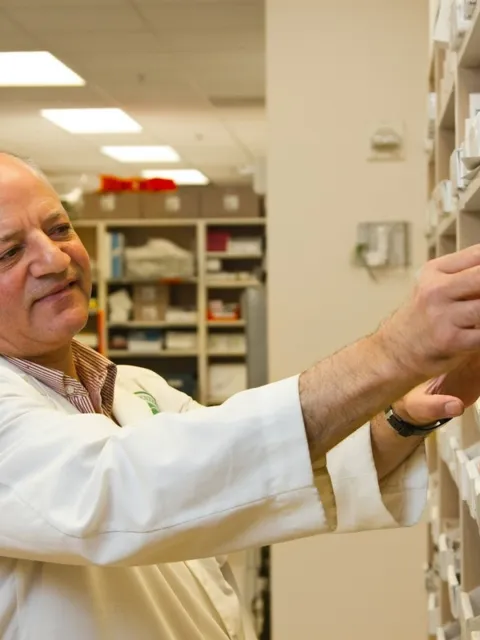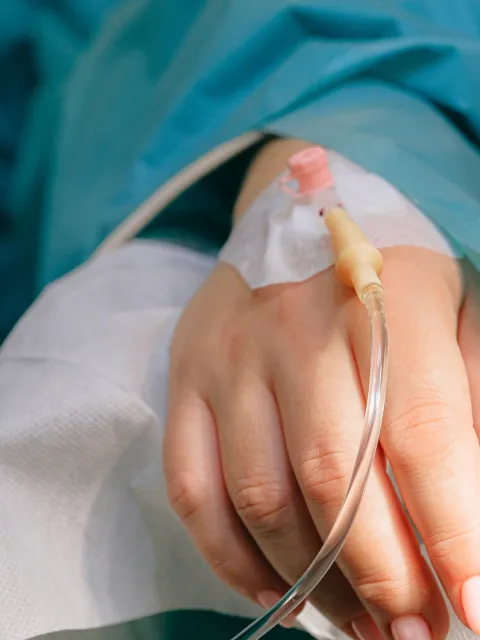The impending public health crisis of antimicrobial resistance
The growing resistance of microbes to medicines that are designed to fight off infections threatens to strain health systems worldwide and could seriously compromise better cancer treatment outcomes.

Antimicrobial resistance or AMR occurs when bacteria and other microorganisms that cause infections change and continue to grow despite medicines designed to prevent them from doing so. This includes resistance to antibiotics, antifungals, antiviral, antimalarials and antiparasitic drugs (antihelmintics). Generally, the more antibiotics and other antimicrobial drugs are used, the more the microorganisms find new ways to survive and become resistant.
People with cancer are at a higher risk of infection due to treatment that may suppress their immune system. Antibiotics are a core part of chemotherapy, radiotherapy and surgery for cancer, with as many as 1 in 5 cancer patients hospitalised due to infection – and antibiotics constitute the first line of defence. Therefore, AMR not only risks compromising the ability to treat cancer patients’ infections but also may limit what kind of cancer treatment can be offered.
AMR may force doctors and patients into a situation where the benefits of surgery or chemotherapy have to be weighed against the risks of contracting an infection that may prove untreatable. There are reports that these harrowing decisions already have to be made. UICC is therefore making AMR a focus of its priority work, globally as well as nationally, in collaboration with its members.
- Dr Sonali Johnson, Head of Knowledge, Advocacy and Policy, UICC
Availability and affordability – access vs excess
It has been estimated that 8.5% of cancer deaths are not directly linked to the cancer itself but to severe sepsis, when the body is unable to fight an infection even with the help of antimicrobial medicine. Pneumonia is another frequent reason for cancer patients being admitted to intensive care units. In some cases, untreatable infections due to “superbugs” that are impervious to existing medications are considered to be more life-threatening than cancer tumours.
The ongoing coronavirus pandemic, which is straining health systems and particularly affecting people such as cancer patients with pre-existing health conditions and suppressed immune systems, has only reinforced this trend. There is now a pressing need to manage better our use of antimicrobial drugs and avoid losing ground in the fight against cancer.
There should be collaborative efforts between governments, the healthcare industry and other relevant stakeholders to pursue, with greater urgency, investments in the research and development of new antibiotics, vaccines, diagnostics and other tools that can address antimicrobial resistance and mitigate cancer patients’ exposure to possible infection.
At the policy level, decision-makers must develop and implement robust national action plans, which take a multisectoral and holistic approach to the problem, recognising the wide-ranging impact of the growing resistance to antibiotics and other antimicrobial drugs. Health authorities should effectively regulate and promote the appropriate use and disposal of medicines, while also putting in place mechanisms to improve data collection and surveillance for evidence-based policy change.
Finally, authoritative information on the dangers of AMR should be made widely available, and there are a number of actions that individuals can take to help prevent infections and of course no-one should take antibiotics unless prescribed by a certified health practitioner.
A first step in addressing the threat of antibiotic resistance is ensuring access to quality-assured affordable life-saving medication, while also addressing the current excessive use of medicines that enable bacteria to develop resistance.
- Dr Cary Adams, CEO, UICC
Raising awareness and mobilising policy change
Responding to the threat of AMR and its impact on cancer care outcomes, UICC has convened a Task Force on AMR and Cancer Care whose aim is to highlight the current evidence on AMR, identify areas where research and knowledge about AMR and cancer care can be strengthened, share best practices, facilitate collaboration within the cancer community, and help bring about policy change on AMR.
Members of the Task Force include experts from Cancer Societies (including Norwegian Cancer Society, Swedish Cancer Society, University of Pennsylvania and Princess Margaret Cancer Centre), the Global Antibiotic Research and Development Partnership (GARDP), ReAct Europe, ReAct Africa, WHO, the International Society of paediatric Oncology (SIOP), the Union, the Wellcome Trust, DnDi, Kenya Hospices and Palliative Care Association (KEHPCA) and the NCD Alliance.
At a preliminary meeting in April 2020, members reiterated the importance of addressing antimicrobial resistance as a priority to improve cancer care outcomes. To this end, they particularly stressed the need to increase awareness of the threat of AMR, the importance of improving data collection and surveillance, and improving access to existing essential medicines. They also emphasised the need for R&D funding for new medicines and diagnostics, and advocate for policy change with regard to reducing excessive use of antibiotics in some regions and increasing access to medicines in low- and middle-income countries.
The task force is developing a programme of work, which includes how and when UICC will reach out to the cancer community to strengthen joint efforts using our convening, capacity building and advocacy platforms.
For further resources and to learn more about AMR and its impact on cancer, please visit UICC's dedicated page, "Antimicrobial resistance and its impact on cancer care".
Last update
Friday 28 May 2021
